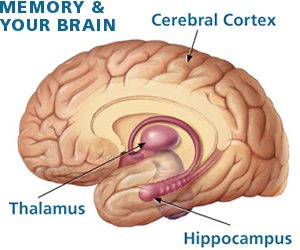Apr 10 2017
New Study on Long Term Memory
 There is something I never fully understood about memory, and now a new study might clarify my confusion.
There is something I never fully understood about memory, and now a new study might clarify my confusion.
The current model of how short and long term memory work is this. Short term memory is formed in the hippocampus and related structures. The hippocampus is highly plastic, it can change rapidly in order to form new real-time memories. However, this plasticity also has the necessary effect of causing recent memories to rapidly fade as they are overwritten.
Short term memory is actually limited in two ways, by the amount of information it can store, and duration. Studies vary in terms of how long short term memories last, but they all agree that it is from 15 seconds to 3 minutes. Measuring this is trickier than it may first seem, because people can “refresh” their short term memory by rehearsal, or from their long term memory, so you have to control for these factors.
There is also something called working memories, and there are varying concepts of exactly what this is. In essence working memory is short term memory that you are currently focusing on and manipulating. For example, if you do math in your head, you are using working memory.
Here’s the part I never fully understood. Most descriptions of how short term memory gets into long term memory are like this one:
Important information is gradually transferred from short-term memory into long-term memory. The more the information is repeated or used, the more likely it is to eventually end up in long-term memory, or to be “retained.” (That’s why studying helps people to perform better on tests.) Unlike sensory and short-term memory, which are limited and decay rapidly, long-term memory can store unlimited amounts of information indefinitely.
See the problem? Short term memory at most lasts a few minutes, but it is gradually transferred to long term memory (at least over a few days). So, where is the memory while it is being transferred? I find that most references just ignore or gloss over this point.
I suspect this is just a description of what we know from experiments, while ignoring the fact that our picture is decidedly incomplete. If we measure short term memory it lasts only a minute or so. It takes days to consolidate long term memory. We also know that short term memory does not require protein synthesis while long term memory does, so they use different mechanisms. Short term memory is in the hippocampus while long term memory is in the cortex.
So, somehow, short term memories get from the hippocampus to the cortex. But we clearly don’t have the whole picture.
Our everyday experience also suggests there is more to the story. You might learn or experience something, and you clearly remember it one hour later, after short term memory should have faded but before long term memory was consolidated. Also, if you did “forget” but were then reminded, the information will likely be familiar. Clearly there was a trace left behind even if it was not strong enough for you to spontaneously recall it.
In light of this the new study makes a lot of sense and perhaps adds the missing piece. Researchers shocked mice in order to create a memory of the experience. They also looked at brain activity while this was happening and followed it over a few days.
They found that the shock simultaneously created activity in the hippocampus and the cortex. In other words, it seems like the short and long term memories were created simultaneously. As the mice recalled the memory, at first hippocampus activity was dominant, but this activity faded over a few days. During that same time cortical activity increased until it dominated.
If this study, which seems robust but obviously needs to be replicated and explored further, pans out then we may have a new model of the relationship between short and long term memory. Both form immediately, with short term memory dominating at first but fading over a few days while long term memory strengthens and then completely takes over.
Of course, long term memory may not consolidate and then the memory fades away. However, with repeated exposure (such as with studying) the long term memory has repeated stimulation and is more likely to form and persist.
That is a much more satisfying model, which doesn’t leave any glaring holes that are just glossed over. We may need to reclassify different type of memory. What, for example, is fading after only three minutes? Perhaps that is really working memory. Or perhaps there are two kinds of short term memories, those that form with long term memories and those that don’t.
Obviously we need to conduct similar studies in humans, and with different kinds of memories (episodic and declarative).
It seems to me that our current models of how memories work are based largely upon psychological studies – seeing how memories work in animals and people and then inferring what is happening the brain from that behavior. Now we have the technology to study memories from the perspective of what is actually happening in the brain. It is not surprising that this new approach will give us more and perhaps better information, and change our models.
It is also clear that memory function in the brain is complex – a network of different functions working together. Our current models are almost certainly too simplistic to capture what is really going on, and again it is therefore not surprising that new research methods will show this to be true.






